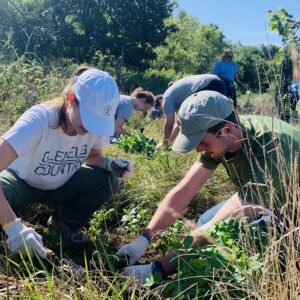Environmental Courses
The environmental courses we offer build the knowledge and skills needed to advance understanding across all dimensions of sustainability (i.e., environmental, social, economic) and lead change through a variety of environmental careers. EVST 100 (Introduction to the Environment), EVST 215 (Environmental Policy), EVST 253 (Environmental Justice), EVST 290 (Climate Change), and EVST 400 (Environmental Capstone) form the core of the curriculum. Students can choose to take more specialized courses as environmental electives.
Below you will find modified versions of recent course syllabi to help you select courses. If a syllabus is unavailable, we encourage you to request syllabi from faculty members directly.
Undergraduate Research Program
Honors Thesis Detailed Timeline and Requirements
EVS&S Program Policy on the Use of Generative AI
Official Course Descriptions
EVST 100: Introduction to the Environment: A Systems Approach
An interdisciplinary course that introduces students to the major issues in environmental studies. We emphasize the importance of analyzing environmental issues from a comprehensive systems approach. The course focuses on the interaction of natural, socioeconomic, political, and ethical systems. We explore pressing social and environmental issues, including climate change, racial inequality, and environmental justice, to highlight the interconnections across multiple perspectives.
EVST 205: Geographic Information Systems for Studies of Environment and Society
Introduction to geographic information systems based on principles of geographic information science including geodesy, data modeling, geodatabase design, spatial analysis, and cartography. Environmental Studies research methods will be used for GIS instruction and will be drawn from the social and natural sciences. A humanistic, critical approach to GIS and the visual narratives encoded in maps will also be explored. Laboratory instruction will focus on developing knowledge and skills for desktop and web GIS applications.
EVSC/GEOL 211: Rivers and Watersheds: Form and Function
This course examines the role of rivers in the landscape within the context of their watersheds. Through a combination of lectures, field and lab exercises, and research projects students will explore the relationships between river hydrology, river morphology, sediment transport, and watersheds. The course will also evaluate how dams and other human disruptions can disturb the natural equilibrium in these dynamic systems. In addition to these scientific approaches, the course will also consider rivers as a focus of philosophical and artistic expression.
Prerequisite: EVST 100 or GEOL 110 or CE 321 or Permission of Instructor
EVST 215: Environmental Policy
This course examines the ways policy seeks to promote environmental value in our complex and changing world. Students will be introduced to the contemporary environmental policy landscape, as well as the politics of environmental decision-making. We will examine and critique policy-making processes, policy actors and influence, dominant policy strategies for environmental change, and environmental policy analysis frameworks. We will draw upon case studies from multiple environmental and political contexts to explore class concepts.
EVST 247: Nature Writing
Nature writing as a genre has long been concerned with questions of how to understand humans within and as nature. In this course, we will study a range of writings, from Thoreau to today, as models for our own writing, emphasizing close observation and revision as vital ways to consider small intricacies of natural life as well as complexes of gender, race, and the engineering of space — all of which make up our own ecosystems. [H, GM1, W]
Prerequisite: FYS
EVST 250: Art and Environment
While one view of art making would suggest elite tools and materials available at a premium through specialty shops, many artists from all over the world-for reasons of politics, philosophy, economics, environmental concerns or conceptual relevance to the given idea-have engaged with found objects and materials to create beautiful, compelling, and revolutionary works of art. In this course we will explore artists and art practices that function in this manner and investigate through studio practice ideas and methods for producing such work. Our investigations will focus on artists whose work is involved with environmental concerns, broadly defined. We will explore and produce work that engages with environment in a social, political, and cultural context. [H]
Prerequisite: Any 100-level Studio Art or Environmental Studies course
EVST 253: Environmental Justice
This course explores the intersection of the arts and environmental justice movements around the world. We will discuss a broad array of literary texts and other creative projects, considering the relationships between systems of human injustice and environmental issues—including industrial disasters, ocean acidification, and resource extraction. Throughout the semester, we will explore questions of voice, genre, and narrative, cataloguing the strategies writers and activists use to make their positions translatable on a global stage. [GM2, W]
EVST 290: Climate Change: The Facts, the Issues, and the Long-Term View
The Scientific community has explored modern climate change for decades, yet only recently has this issue emerged in the consciousness of the broader society. This writing-intensive, discussion-based seminar will consider the scientific evidence that has climate experts concerned about the future, as well as the significant economic, moral, political, and social issues that human-induced climate change raises. We will explore the challenges as well as the proposed solutions for addressing this global environmental problem. [V, W]
Prerequisite: Sophomore standing or permission of the instructor
EVST 315: Food, Culture, and Sustainable Societies
We ask, critically, what sustainable and just mean in relation to food and why it matters – and what “culture” has to do with it. To do so we merge well-established studies and work in the anthropology of food with (1) environmental studies of alternative food systems and urban gardening/farming. (2) studies from political ecology engaging a range of analysis on food, (3) critical food studies, which considers race/class/gender/globalism in the context of food.
Prerequisite: One environmental course
EVSC 322: Environmental Site Assessment
Introduction to preliminary site investigations for environmental hazards. Topics include identification of wetlands, title searches, air photo interpretation for environmental hazards, visual site surveys, operation of environment monitors, current EPA regulations regarding site assessment and investigation, and sampling of surface materials. Lecture/discussion/laboratory.
Prerequisite: CHEM 121 or permission of instructor
EVSC 352: Hydrology
Introduction to engineering hydrology, primarily dealing with surface waters. Topics include hydrologic cycle, frequency analysis, rainfall/runoff relationships, routing, and storm water management and design. Design problems using current hydrological computer models are assigned. Lecture.
Prerequisite: CE 251
EVST 373: Technology and Nature
This course examines the sometimes-contentious relationship between the natural world and human attempts to understand it (science) and manage it (technology). It addresses historical, ethical, artistic, and scientific distinctions between the natural and the human-built world, with examples from food and agriculture, modes of transportation, river control, factories, and more. The purpose of the course is to help students develop a nuanced understanding of the interactions amongst and between technology and nature. [W]
Prerequisite: A prior writing [W] course
EVST 375: Sustainability in the Urban Environment
This course will discuss the unique ecological, economic, and social considerations of the human-nature dimension in urban and regional environments and explore best practices for fostering sustainability in these settings. Specific topics include food systems, urban wildlife, and green infrastructure.
Prerequisite: EVST 100 or EVST 215 or EVST 253 or EVST 290 or permission of instructor.
EVST 380: Sustainability Internship
The Sustainability Internship provides course credit to students working on sustainability-related projects. It is jointly supervised by a staff member of the Office of Sustainability or other partner organization, and a faculty member affiliated with the EVST/EVSC program. The intern meets regularly with their supervisors and submits a written report at the end of the semester demonstrating their contribution to the sustainability goals of the partner organization through research, critical thinking, and problem solving.
By permission only. See requirements on the syllabus here. Interested students must complete a Sustainability Internship Project Approval Form.
EVST 400: Capstone
This course serves as a capstone to the Environmental Studies program. In this course, students will perform research under the guidance of a faculty mentor. Students will apply their knowledge from coursework to enhance empirical understanding of environmental studies issues. In addition to performing the research, students will present their research to the Environmental Studies program and provide a written report to their mentor.
Prerequisite: Permission of instructor




